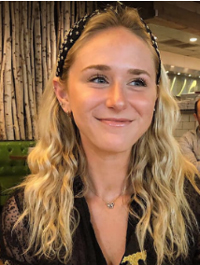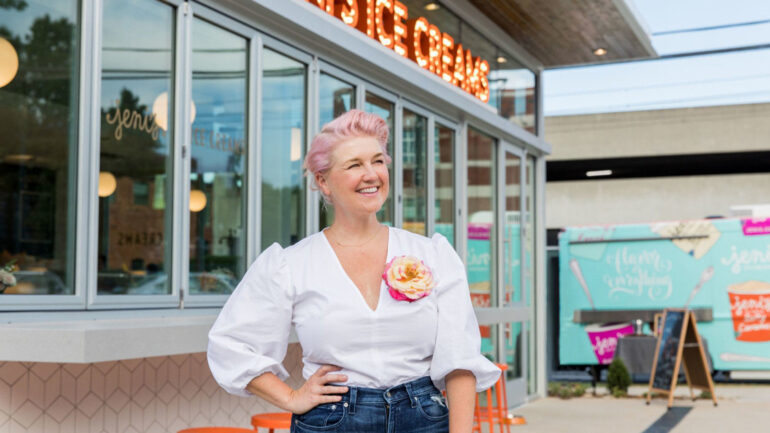On May 22, 2020, The Executives’ Club of Chicago hosted Jeni Britton Bauer in conversation with their President and CEO, Margaret Mueller, to discuss all things ice cream – and how her business has managed to thrive through crisis (hint: it involves caring for your community).
Jeni’s Splendid Ice Creams was born out of a creative appreciation for sensory experience.
In 1996, Jeni Britton Bauer was a 22-year old art student deeply curious about the possibilities scent held in the art world. Her days became defined by her nose – studying the chemistry of scent in school and then enveloped in the sweet, inviting perfume of the pastry shop where she worked. It was not long before these three passions – art, scent and pastry – became Britton Bauer’s first successful recipe.
“I knew I needed to make ice cream,” Britton Bauer explains. “One day I just picked up my belongings, walked out of art class and never looked back.” Now 46, Britton Bauer credits this can-do spirit to growing up in the Midwest, the land of dairy and doers.
View this post on Instagram
Britton Bauer started small, and built slowly. Her first shop was called Scream, which became the prototype for Jeni’s as we know it today.
“I call the years developing Scream, my MBA,” she jokes.
Scream was certainly a crash course in business development and operation. Operating out of a 175-year old public market near downtown Columbus, the community of merchants and their artisanal goods became a part of Britton Bauer’s scoops. She experimented with flavors and learned to work from ingredients (some more ambitious than others). Her process was driven by real growers and farmers, with their ingredients and stories serving as the inspiration in each flavor.
“I found that everything tastes good in ice cream,” she explains. “But, that doesn’t mean it should be in the ice cream.” At one point there was some experimentation with fish, but alas, it did not end up in Jeni’s Salty Caramel and Ooey Gooey Butter Cake.
An artist by trade, Britton Bauer finds inspiration in the world around her – from current events, change makers, pop culture and history. Her inspiration for the Brown Butter Almond Brittle Pint came from “krokan,” a Scandinavian dessert that her favorite author Roald Dahl had a particular affinity for. Another flavor, the Sunshine Pint, was inspired by the Depressed Cake Shop and created to help dispel stigma around mental health. The pint was available during Mental Health Awareness Month in April.
This month, Jeni’s unveiled a collection of State Fair-inspired flavors – as the beloved summer tradition is cancelled in many states due to the coronavirus pandemic.
View this post on Instagram
Jeni’s is in constant pursuit of customer connection, not just with flavors, but with the entire brand experience. To them, even the small, often overlooked details – like the temperature of their scoop shops in winter— matter. In Britton Bauer’s book, Jeni’s Splendid Ice Creams at Home, her chapter about ice cream in winter is, unexpectedly, the longest and most flavorful.
“We never forget who we are serving: our team and our community. That answers every question for us,” she says.
This mindset was paramount when the company encountered an unexpected health crisis in 2015. Listeria was detected in one of their ice cream pints at a facility in Lincoln, Nebraska. An ominous reality for working in the food industry.
“It changed everything in a matter of hours,” Britton Bauer remembers.
Instead of waiting to be regulated by the FDA, Jeni’s made the decision to do a total recall of their inventory. At the time of detection, they were not confident in the source of contamination, and did not want to take any chances with their customers’ health. And their caution was rewarded. Reportedly, no customers became ill from their product.
At the time of the recall, Jeni’s was on top of the ice cream world. They had just opened their first scoop shop in Los Angeles and were receiving substantial media attention. But success, to Britton Bauer and her team, was always second to their customers. Jeni’s sent all of their recalled product — 265 tons of ice cream— to an anaerobic digester to be turned into energy. They had nothing left.
“Who are we? Who are we not?” she remembers thinking at the time. “When you fall back on your values, you can solve a lot of problems.”
And from crisis, came solidarity. They implemented a new program in their kitchens, new safety standards and new development protocols. And, perhaps most importantly, they were honest about the situation from its inception. Britton Bauer and company CEO John Lowe wrote a post they nicknamed the “14-Minute Blog Post,” which addressed what had happened, and what they were doing about it, with radical transparency.
“A lot of times leaders won’t talk because they don’t know what to say,” Britton Bauer explains. “But if you say nothing, your story will be told for you.”
Jeni’s commitment to impact and authenticity is further underscored by their position as a Certified B Corporation. B Corps are “businesses that meet the highest standards of verified social and environmental performance, public transparency and legal accountability to balance profit and purpose.” Their mission is to build both a more sustainable and inclusive economy. Every two years, B Corps are audited and receive a score based on their social and environmental practices. It encourages businesses to constantly assess their practices and to shift the business landscape towards one that places value on positive impact.
The listeria recall and their participation as a B Corporation, ultimately prepared Jeni’s for what was to come this year, in 2020. As the coronavirus pandemic took hold of American society, Jeni’s again paused to consider their customers and their employees. Leadership met every day at the beginning of the pandemic to both develop, and then constantly reassess their plan. They went so far as to change their company’s mission statement. According to Britton Bauer, this interim mission is two-fold: to prioritize the health and safety of their team and their community, and to generate enough business to bring back the employees that were furloughed.
View this post on Instagram
As Americans retreated to the safety of their homes, Jeni’s virtual store became a respite for those looking to savor their favorite flavors while sheltering-in-place. Now, as scoop shops across the country begin to reopen, the team remains committed to their updated mission statement.
Recent events have again prompted brands to rethink their practices. When George Floyd was killed by members of the Minnesota Police Department on May 25, Jeni’s took action without hesitation. Lowe, on behalf of Jeni’s, drafted a letter to the Columbus City Council in support of a resolution put forward by Council Member Priscilla Tyson, declaring racism a public health crisis. Upon delivery, 750 Columbus business and organization leaders had co-signed it. As of June 1, another 500 had put their names to it.
“Not everything a company does needs to be marketable,” Britton Bauer says. “Businesses can be a force for good, every decision we make has the potential to do good.”
Watch the full conversation here:
More from Better:
- The Ultimate Guide to Better Summer Picnics
- 3 Key Strategies to Talk to Young Children About Racism and Social Justice
- Following the Cheese Trail: The Ultimate ‘Cheesecation’ Through Wisconsin
Our Best of 2020 voting is now open! If you live in Chicago, don’t forget to vote for your favorite local businesses.
 Madison Muller is the Assistant Digital Editor at Better. A recent graduate of Northwestern’s Medill School of Journalism, she approaches our contemporary media environment with compassion and candor. She is interested in writing about the intersectionality of social justice issues in marginalized communities and environmentalism. Madison proudly supports Action Now, a community organization that empowers and uplifts residents on Chicago’s West Side.
Madison Muller is the Assistant Digital Editor at Better. A recent graduate of Northwestern’s Medill School of Journalism, she approaches our contemporary media environment with compassion and candor. She is interested in writing about the intersectionality of social justice issues in marginalized communities and environmentalism. Madison proudly supports Action Now, a community organization that empowers and uplifts residents on Chicago’s West Side.
She also encourages reading and supporting The Marshall Project, a non-profit news organization that seeks to create and sustain a sense of national urgency about the U.S. criminal justice system.

